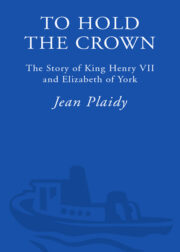The castle was built high on a headland, its foundations grafted into the gray rock, and guarded by a deep and wide fosse. There was a vast early Norman square tower and impressive battlements, which gave it a comforting air of impregnability. It was set in beautiful country overlooking the town of Ludlow; on all sides was the green countryside—woods, hills and fields rolling on to the horizon.
Katharine thought it very beautiful; she loved the greenness of everything, which she had noticed on her arrival in England. She thought she would be very happy here, for she was happy with Arthur. They were good companions; they studied together; she was learning to speak English and was teaching him Spanish. She was always careful never to tire him and he was grateful because she did so unostentatiously.
The Welsh accepted them and liked them. The chieftains called at the castle. One of them brought his son hoping that he would learn to be a squire in the Prince’s household. Arthur accepted him and Griffith ap Rhys became a friend of both Arthur and Katharine, greatly to the delight of the boy’s father and the people of Wales.
Such happy days they were! Katharine had almost ceased to think of Spain and the longing to be with her mother was less than she had thought it possible to be.
Arthur’s health seemed to improve a little. He could ride for longer hours and he and Katharine tried out a few dances together. He was so grateful because if he became breathless she always made some excuse to stop.
They were ideal companions and Arthur was deeply contented with his marriage. He was able to explain to her how he dreaded having to take part in ceremonial and she understood.
“If I am ever king I shall dispense with a great deal of it,” he told her. “It is not necessary, you know. It does not make a good king because he has to dance and make good speeches. . . .”
Katharine agreed with him.
“When we are the King and Queen we will live at Ludlow . . . oh, I know, not for all the time. But we could come here often could we not?”
“We will,” said Arthur.
He could talk to Katharine as he had never been able to talk to anyone before. To her he confided that he had always thought he should have been born second, Henry first. “Henry would have made such a good king and I should have been well enough in the Church.”
“You would not have married me,” she reminded him.
“Ah,” said Arthur. “You are right. Then I would not have anything other than it is.”
News came from the Court. There was to be a grand celebration for Arthur’s sister Margaret was to be betrothed to the King of Scots. The news threw a certain gloom over the household at Ludlow. The thought of having to leave his newly found peace for the ceremonies of Court depressed Arthur.
Katharine comforted him but his depression frightened her a little. Surely their future life when Arthur was king would be a continuation of such occasions.
She would have to talk to him of this; she would have to stand beside him, help him to overcome his shyness. She was confident that together they would face whatever lay before them.
And then the good news. The King thought it was not necessary for the Prince of Wales to come to Court. His brother Henry would play his part in the ceremonies and Arthur should stay at Ludlow.
Arthur was overcome with joy and Katharine was delighted to see him so relieved; but afterward she thought of the matter and she knew that the reason his father had not wished him to be present was because he feared the journey to Richmond would be too strenuous for him and might have a damaging effect on his health.
She was very anxious when he looked so tired, but she assured herself that he was better since they had lived quietly at Ludlow. All was going to be well. She would look after him, make sure he did not exert himself and in time, she assured herself, his health would improve.
She must count her blessings. She was lucky. She only had to look back a little way to remember how she had been dreading her marriage; and here she was with the gentlest of husbands, who was kind and clever, interesting and tender. What good fortune was hers! She would write home and tell her mother how happy she was.
Another ceremony! How young Henry loved them—particularly, as on this occasion, when his brother was not present. That gave him added importance. He walked beside the King and was accorded the homage which would have been Arthur’s if he had been present, so that he could imagine that he was the Prince of Wales—king-to-be.


"To Hold the Crown: The Story of King Henry VII and Elizabeth of York" отзывы
Отзывы читателей о книге "To Hold the Crown: The Story of King Henry VII and Elizabeth of York". Читайте комментарии и мнения людей о произведении.
Понравилась книга? Поделитесь впечатлениями - оставьте Ваш отзыв и расскажите о книге "To Hold the Crown: The Story of King Henry VII and Elizabeth of York" друзьям в соцсетях.